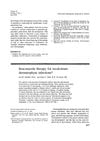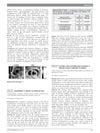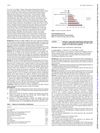January 2023 in “International Journal of Trichology” Alcohol-free minoxidil is better for treating hair loss in Indian men.
November 2022 in “Cureus” New biomaterial treatments for baldness show promise, with options depending on patient needs.
January 2021 in “Menoufia Medical Journal (Print)” Androgenetic alopecia negatively affects emotions and self-confidence, especially in younger people.
 September 2017 in “Majallah-i taḥqīqāt-i ̒ulūm-i pizishkī-i Zāhidān”
September 2017 in “Majallah-i taḥqīqāt-i ̒ulūm-i pizishkī-i Zāhidān” Androgenetic alopecia is a long-term, immune-related disorder that starts during puberty due to androgen secretion, and it might be improved with iron tablets, platelet transfusion, and anti-inflammation therapy.
 11 citations,
July 2001 in “APMIS. Acta pathologica, microbiologica et immunologica Scandinavica./APMIS”
11 citations,
July 2001 in “APMIS. Acta pathologica, microbiologica et immunologica Scandinavica./APMIS” Estrogens are key for bone growth spurts in both boys and girls and affect growth into adulthood.
July 2001 in “APMIS. Acta pathologica, microbiologica et immunologica Scandinavica./APMIS” Male children's genital development issues can be caused by genetic mutations or environmental factors affecting hormone action.
98 citations,
March 2019 in “Frontiers in immunology” Damaging mutations in NFKB2 cause a severe and distinct form of primary immunodeficiency with early-onset and often ACTH-deficiency.
 291 citations,
January 2014 in “The Scientific World Journal”
291 citations,
January 2014 in “The Scientific World Journal” Lichen Planus is a less common condition affecting skin and mucous membranes, with various types and associated risk factors, challenging to diagnose, significantly impacts life quality, and may have a risk of cancerous changes in oral lesions.
 11 citations,
January 2015 in “Skin pharmacology and physiology”
11 citations,
January 2015 in “Skin pharmacology and physiology” Eating collagen peptides may help with skin and hair growth.
 1 citations,
July 1998 in “JAMA”
1 citations,
July 1998 in “JAMA” The book provides a historical view of abortion in the U.S., critiques the pro-choice movement, and recommends including abortion in medical education.

COVID-19 vaccines had more side effects and worse perception than flu vaccines in Korean lupus patients.
 1 citations,
January 2013 in “Chronicles of young scientists”
1 citations,
January 2013 in “Chronicles of young scientists” Immuno-cosmeceuticals from chicken egg yolk can effectively repair and improve damaged hair.
 January 2010 in “Actas Dermo-Sifiliográficas”
January 2010 in “Actas Dermo-Sifiliográficas” A woman was allergic to quinine in her anti-hair loss lotion.
 110 citations,
July 2017 in “Immunology”
110 citations,
July 2017 in “Immunology” Skin's Regulatory T cells are crucial for maintaining skin health and could be targeted to treat immune-related skin diseases and cancer.
 42 citations,
June 2020 in “Seminars in Oncology”
42 citations,
June 2020 in “Seminars in Oncology” Sex hormones may affect COVID-19 severity, with men often faring worse, and targeting related pathways could offer treatment options.
 4 citations,
November 2011 in “Archives of Dermatology”
4 citations,
November 2011 in “Archives of Dermatology” Hamilton scale imprecise, hair shaft diameter decreases, stem cell transplant regrows hair, ECP ineffective for alopecia areata universalis.
 October 2022 in “Southeast Asian journal of health professionals”
October 2022 in “Southeast Asian journal of health professionals” Hair greying is seen as a sign of aging; temporary fixes like hair dye are used, but a balanced diet and hair care can help manage it.
 107 citations,
August 2012 in “Seminars in Cell & Developmental Biology”
107 citations,
August 2012 in “Seminars in Cell & Developmental Biology” The document concludes that understanding the sebaceous gland's development and function is key to addressing related skin diseases and aging effects.
 72 citations,
June 2013 in “Journal of feline medicine and surgery”
72 citations,
June 2013 in “Journal of feline medicine and surgery” The document says to treat cat fungal infections with medicine and clean the environment, noting that cats without symptoms can still spread it to humans.
 72 citations,
January 2001 in “Drugs”
72 citations,
January 2001 in “Drugs” Minoxidil and finasteride treat hair loss; more research needed for other options.
 59 citations,
February 2012 in “Journal of Dermatological Science”
59 citations,
February 2012 in “Journal of Dermatological Science” Environmental factors at different levels control hair stem cell activity, which could lead to new hair growth and alopecia treatments.
 32 citations,
January 2012 in “International Journal of Dermatology”
32 citations,
January 2012 in “International Journal of Dermatology” Skin side effects from EGFR inhibitor cancer treatment can be managed effectively, often without stopping the medication.
 25 citations,
March 2019 in “Dermatologic therapy”
25 citations,
March 2019 in “Dermatologic therapy” Intralesional therapy for keratoacanthoma is effective and has fewer side effects than systemic treatments.
 18 citations,
May 1988 in “Journal of The American Academy of Dermatology”
18 citations,
May 1988 in “Journal of The American Academy of Dermatology” Itraconazole helps improve tough skin infections but may not prevent them from coming back.
 13 citations,
August 2020 in “Frontiers in Immunology”
13 citations,
August 2020 in “Frontiers in Immunology” Gamma delta T cells in the skin help with healing and defense but can also cause autoimmune issues, and more research is needed to understand how they are activated.
 9 citations,
June 2014 in “Nutrition and Cancer”
9 citations,
June 2014 in “Nutrition and Cancer” Eclipta alba extract may work as an anticancer agent and help reverse drug resistance.
 9 citations,
March 2011 in “Oxidative stress and disease”
9 citations,
March 2011 in “Oxidative stress and disease” Some herbal treatments are effective for skin disorders, but more research and regulation are needed.
 4 citations,
January 2020 in “Lasers in Surgery and Medicine”
4 citations,
January 2020 in “Lasers in Surgery and Medicine” Using a 308-nm excimer lamp with minoxidil promotes hair growth in Alopecia Areata patients, especially younger ones or those with smaller bald spots.

Systemic lupus erythematosus is diagnosed earlier in males than females.

Older men with late-onset lupus have a higher mortality rate than women.
























